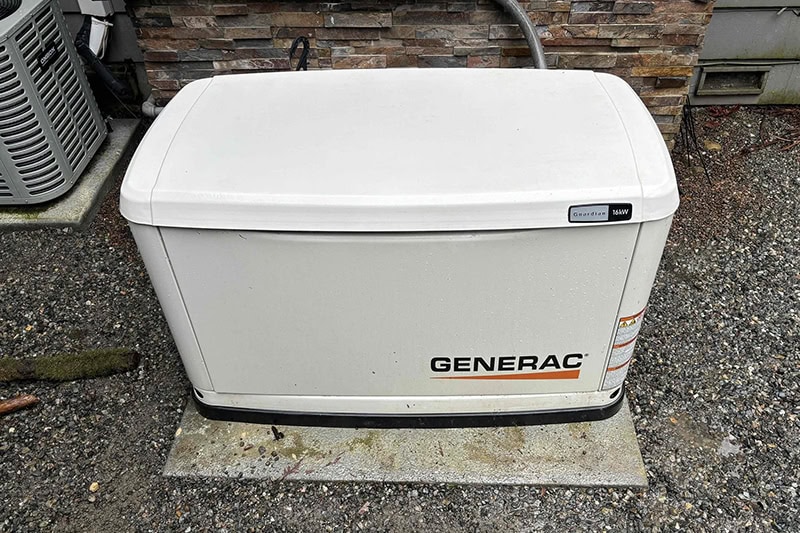Power Outage? A Standby Generator Will Help You Weather the Storm

A whole-house generator—also referred to as a standby generator—is a lifeline during a power outage. In Washington, power outages aren’t an “if” but a “when.” In fact, according to the U.S. Energy Information Administration, U.S. citizens experienced nearly five and a half hours of power outages in 2022.
It can keep the lights on, run your refrigerator and oven, enable your heating, ventilation, and air conditioning (HVAC) system to continue working, and power your sump pump, among other appliances.
In some cases, it can save lives by powering home breathing machines, dialysis equipment, and oxygen generators.
Lifetime Heating, Cooling, Plumbing & Electric can install a standby generator outside your Everett, home, just like an air conditioning unit. When a storm, disaster, or equipment failure disrupts power from utility lines to your home, the generator will kick in and maintain power until your electrical services are restored.
Our friendly and knowledgeable professional can help you choose a standby generator that will suit your needs, and we can install it too.
What Is the Difference Between a Standby Generator and a Portable Generator?
A standby generator typically runs on natural gas or propane. It sits on a pad outside your home and turns on automatically when it detects power loss.
A transfer switch enables it to send power to the electrical circuits in your home and then switches back to standby when electricity from utility lines is restored. It works whether you are home or away.
A portable generator uses gasoline, although some models also accept propane. It is noisier and produces less power than a standby unit. It also requires a hands-on start. During a power outage, homeowners must follow a series of steps to start and run the machine safely.
You must also set up the portable generator a safe distance from your home’s doors and windows to avoid the risk of deadly carbon monoxide (CO) poisoning.
Standby generators are quieter than portable equipment. They are also safer because extension cords are not needed to connect appliances, and the risk of CO poisoning is greatly reduced due to municipal code requirements that need to be met for installation.
Advantages of a Whole-House Generator
Here are some reasons why you might need a standby generator for your Everett, home:
- Ensure an uninterrupted power supply: Imagine being without power during extreme weather conditions, such as a hurricane or snowstorm, when power outages can last several days or even weeks. A whole-house generator keeps your family and home safe and comfortable.
- Protect valuable electronics: Power surges can damage electronic devices and appliances in your home, leading to costly repairs or replacements. A whole-house generator minimizes any damage to your valuable electronics by ensuring they remain powered and safe during a power outage.
- Maintain security: Your home security system may not operate during a power outage, leaving your home vulnerable to theft or other crimes. A whole-house generator can keep all your systems running, giving you peace of mind.
- Medical equipment: A whole-house generator becomes an essential tool for anyone in your household who relies on medical equipment that requires electricity. A generator ensures your medical equipment remains powered, even during a power outage.
How Do Generators Work?
One of our Lifetime Heating, Cooling, Plumbing & Electric electricians will inspect your electrical panel and determine if it requires an upgrade. During installation, the expert will install a transfer switch. The switch blocks the utility line to your home’s electrical system when the power goes out, allowing the generator to kick in.
When the utility power is restored, it switches from generator to utility.
You will need to decide where to locate the generator outside your home and whether it will use natural gas or propane. Choose carefully because standby generators are permanent installations and typically last up to 40 years with regular maintenance.
After the unit is moved onto a permanent pad, our electrician will run an electrical line from the transfer switch to the generator. A pipe fitter will connect the equipment to a fuel source. When the electric and fuel sources are connected, the standby generator is ready for use.
Generators come in different sizes based on how much electricity you might need. What is the easiest way to size a generator? Have one of our experienced electricians accurately assess power needs for your Everett, home.
Contact Lifetime Heating, Cooling, Plumbing & Electric to Install Your Generator
Don’t wait until the next power outage in Everett, leaves you in the dark—contact Lifetime Heating, Cooling, Plumbing & Electric today to schedule your generator installation. Our experienced team will help you choose the right backup power solution for your home or business, ensuring peace of mind when it matters most.
From expert recommendations to professional installation and ongoing support, we’re here every step of the way. Reliable power starts with a trusted local partner—call Lifetime Heating, Cooling, Plumbing & Electric at 425-200-4999 or request service online and protect what matters most with a dependable generator system.

